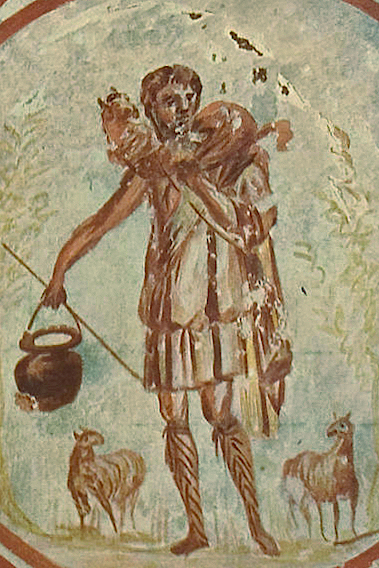
More classic art masterpieces used as illustrations
STL;DR:
Psalm 23 celebrates God’s tender care, guidance, and protection, portraying Him as a shepherd who provides rest, peace, and restoration to His people. The psalm assures believers that even in life’s darkest valleys, God’s presence brings comfort and courage. The page also includes an acrostic poem using the letters of the word "shepherd." There are also five noteworthy quotes about Psalm 23, as well as an ancient painting in the catacombs near Rome of a shepherd with a lamb around his neck.

What is the message of Psalm 23 for us today?
23 1 The Lord is my shepherd, I lack nothing.
2 He makes me lie down in green pastures, he leads me beside quiet waters,
3 he refreshes my soul. He guides me along the right paths for his name's sake.
4 Even though I walk through the darkest valley, I will fear no evil, for you are with me;
your rod and your staff, they comfort me.
5 You prepare a table before me in the presence of my enemies.
You anoint my head with oil; my cup overflows.
6 Surely your goodness and love will follow me all the days of my life,
and I will dwell in the house of the Lord forever.
"Afraid? Why should I be afraid? We've passed through worse things than a storm of rain before. He who has protected us for so long will protect us now."
As Renzo crouched behind that hut, hiding from the authorities, he could hardly believe his ears. That sweet, melodic voice! Could that have been Lucia?
It is a climactic moment for this engaged couple, who are the hero and heroine of Alessandro Manzoni's 1927 historical novel, I promessi sposi (The Betrothed). The voice talking about the care and protection of our Good Shepherd was indeed Lucia. At long last, the two lovers are reunited.
An Italian literature classic, I promessi sposi takes place 300 years ago when much of Italy was at the mercy of petty noblemen whose bands of arrogant desperados ran roughshod over law and justice.
One of these villains is Don Rodrigo. He is intent on forcing Lucia to marry him instead of Lorenzo (who goes by "Renzo"). She refuses and is forced to flee her peaceful village to escape his clutches.
The novel is the story of Lucia's and Renzo's search for each other in the turbulent history of early 17th-century Italy. It is very much a "valley of the shadow of death" described in Psalms 23. It was a time of violent bread riots, the ravages of the Thirty Years War, famine, and the horrors of a bubonic plague epidemic.
In fact, it is a camp for dying plague victims that Renzo and Lucia are reunited after he overhears her talking about the comfort and care of the Lord.
To be sure, Alessandro Manzoni's Lucia is not an evangelical Protestant. She is very much steeped in the Roman Catholicism of 17th-century Italy. However, her assuring words to a dying friend make me think of the affirmation of Psalm 23 that trusting in God will bring rest, peace (shalom), comfort, and even triumph in the presence of fear.
Psalm 23, that beloved passage from the collection of Hebrew songs we call psalms, is full of theological truths concerning the unique relationship human beings can have with their Creator. Framed in sheep/shepherd terms, Psalm 23 tells us a great deal about the nature of God and His desires for us.
God cares, protects, and even corrects his people, just as a good shepherd cares for his flock. God's presence with us is promised now and forever. And that includes whatever dark valleys may lie between here and forever -- be they bread riots or rainstorms.
Our Shepherd's loving care for us includes the rebuilding and restoring of shattered spiritual capacities. To obtain the bountiful blessings in Psalm 23 we must trust our Shepherd as fully and completely as a sheep trusts its shepherd.
I don't know what dark valleys you have been through lately. But, let me ask you a question. Can you say, "The Lord is my Shepherd"? If you can, then you will be able to repeat the other phrase as well: "I will fear no evil."
I wrote this devotional blog while Barbara and I were serving as missionaries in Italy. It originally appeared in Standard, a weekly Faith Connections take-home curriculum piece for adult Sunday school classes published by The Foundry.
-- Howard Culbertson, hculbert@snu.edu
"The Lord is my Shepherd" is a phrase from Psalm 23, one of the most well-known and beloved Old Testament passages. This psalm uses the imagery of a shepherd caring for his flock to describe a person's relationship with God.
Saying "The Lord is my Shepherd" expresses belief that God provides guidance, protection, and care for his people, just as a shepherd tends to his sheep. It should form in us a trust in God's provision, guidance, and protection.
The shepherd-sheep metaphor captures the intimate and personal relationship between believers and God. It carries the idea that we depend on God for sustenance, guidance, and safety, much like sheep depend on their shepherd for everything they need.
In short, saying "The Lord is my Shepherd" is a declaration of our faith, trust, and reliance on God's loving care and guidance. It's an affirmation that God is the provider and protector of His people.
S – Strong is His love that never fades.
H – He leads us through the darkest times.
E – Ever faithful, His grace abounds.
P – Protecting us when life's storms get overwhelming.
H – Holding us close through trials deep.
E – Each of His promises He will keep.
R – Rest for the weary, safe in His arm.
D – Delivering us from every harm.
Like acrostics? Here are more of them
Memorable Quotes About Other Bible Verses